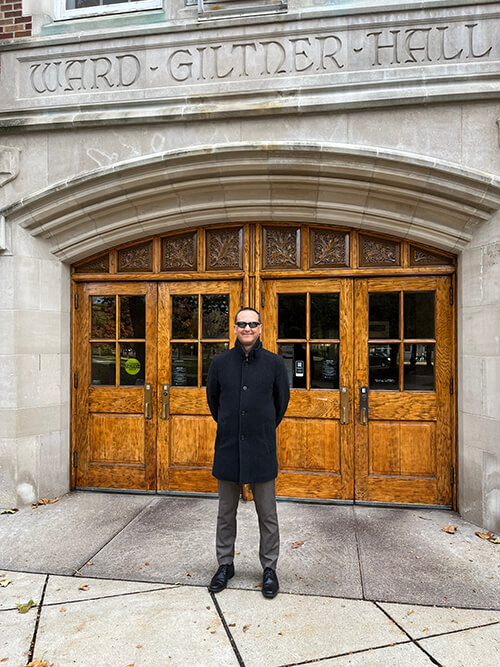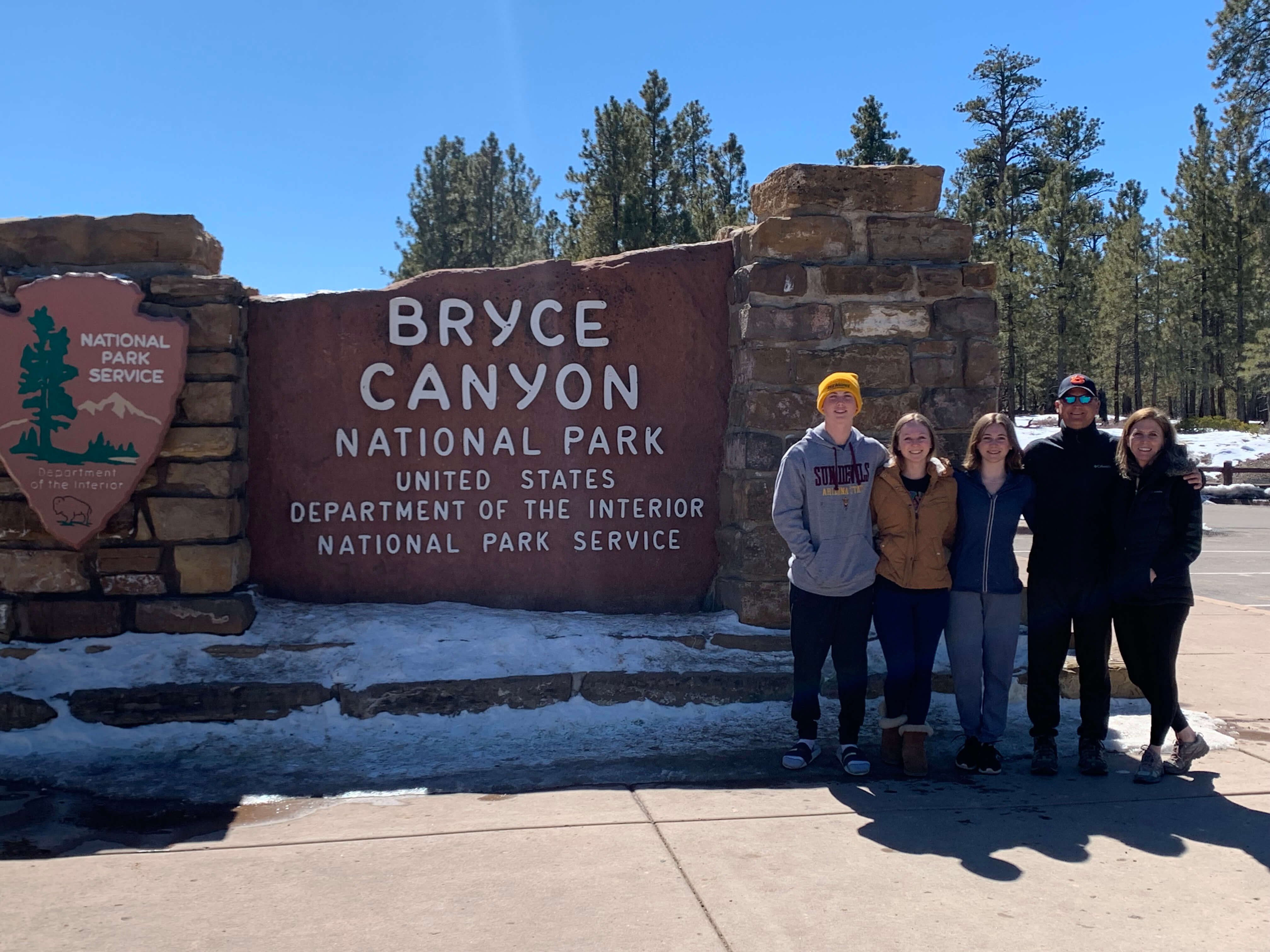MSU welcomes Kevin McGraw
Article Highlights
- Kevin McGraw is joining MSU in May as the new chair of the Department of Integrative Biology.
- McGraw joins MSU from Arizona State University, where he was a professor of evolutionary and systems biology, as well as the associate director of operations and facilities for the School of Life Sciences.
- “I’m excited to listen and learn from my MSU colleagues and capitalize on my experiences at a large university in ASU to catalyze a new era of discovery and advancement as a Spartan,” McGraw said.
For more than two decades, Kevin McGraw has been fascinated by how animals communicate using their voices, behaviors and even colors. It’s fitting, then, that a color change is helping him announce a new era in his career.
In May, McGraw will be donning Spartan green and white as his lab joins Michigan State University and he steps into his role as the new chairperson of the Department of Integrative Biology, or IBIO.
“With two and a half decades behind me in academia, I’m at a natural turning point to take some bold new steps with my work,” McGraw said. “I can’t wait to do this with my new MSU colleagues and their exceptional strengths and visions.”

Kevin McGraw, the new chair of the Department of Integrative Biology. Credit: Courtesy Kevin McGraw
McGraw is coming from Arizona State University — one the largest public research universities in the country — where he served as a professor of evolutionary and systems biology. He was also the associate director of operations and facilities for the School of Life Sciences.
“At this phase of my career, I really crave the opportunity to work at a smaller scale, connecting with people in a comparatively more intimate work environment,” McGraw said. “IBIO presents that perfect opportunity with such a great history and composition of faculty, students, research foci and academic programs. I thank the department and Interim Chair Catherine Lindell for creating such a positive environment that sets up our future so well.”
McGraw believes the change will give him new opportunities to play to his strengths as an open communicator who emphasizes accessibility and teamwork to foster the growth of the department, its programs and its people.
“An enthusiastic welcome to incoming IBIO chair Dr. Kevin McGraw, who is an experienced administrator and accomplished behavioral ecologist,” said Phil Duxbury, Dean of the College of Natural Science. “We are thrilled that he and his team are joining us, bringing new dimensions of scholarship and leadership to support the excellence of the department and the closely affiliated graduate program in Ecology, Evolution and Behavior.”
New horizons
McGraw wanted to devote the next phase of his academic career to a leadership role while advancing his research in new directions. IBIO was an attractive place to take on that pursuit because of its unique strengths and the opportunities it presents to collaborate within the college and across the university.

Kevin McGraw stands in front of Giltner Hall during a visit to campus in fall 2023. Credit: Courtesy of Kevin McGraw
“MSU has so many strengths in zoology, both within IBIO and the College of Natural Sciences but also including the College of Veterinary Medicine, the College of Agriculture and Natural Resources, and the Kellogg Biological Station,” McGraw said. “Joining forces with these groups is really appealing to me.”
In fact, one of McGraw’s marquee initiatives once he joins will be creating the Center for the Study of Rapid Organismal Change. The center will leverage expertise from across MSU to better understand how humans and other organisms can coexist during this period of rapid environmental transformation.
This dovetails with the research themes in McGraw’s own group, which has focused on animal communication in the natural world and human-impacted environments. The latter theme emerged as McGraw joined the faculty at ASU in Tempe and became interested in the delicate ecological balances at work in the desert city.
“I felt I owed it to myself and my career to add an urban-ecology arm to my research and investigate how animals, including their colors and behaviors, are responding to and shaping human and urban activities,” McGraw said.
He’s now looking forward to what changes his move to Michigan will help inspire, not just in his own lab, but for the department as well.
“As academics, we’re always evaluating and reinventing ourselves. Research ideas only last so long these days, so we must be nimble in devising new study questions, involving diverse personnel and securing different funding sources to catalyze our latest initiatives,” McGraw said. “I’m excited to listen and learn from my MSU colleagues and capitalize on my experiences at a large university in ASU to catalyze a new era of discovery and advancement as a Spartan.”
Evolutionary history
As a biology major at St. Lawrence University in northern New York, McGraw also played Division III baseball and wasn’t sure what he wanted to do professionally until his sophomore year.

That’s when he started taking environmental science courses, particularly conservation biology and tropical ecology, which were taught by a bird biologist.
“We went to Costa Rica during winter break as a part of the coursework and I was instantly hooked,” McGraw recalled. “There were so many beautiful birds — I couldn’t get enough. We tried to see as many species as possible over the 10-day trip. From there, I knew I wanted to study the evolution, ecology and behavior of wild, colorful animals.”
He still considers the resplendent quetzal, a Costa Rican bird with vibrant red and green colors and a long tail, one of his favorite birds. Another favorite is the house finch, found across the USA and whose males don beautiful red feathers, because, “they’ve given us so much science.”
With his history and love of birds, it’s easy to understand why McGraw’s been characterized as a “bird nerd.” But his team’s research has grown to study the colors of a number of animals, including spiders, butterflies and chameleons.
Outside the office
Amidst all his professional passions in academia, sports remain a big part of McGraw’s life.
He was an assistant Division I baseball coach while a graduate student at Cornell University and he would later coach his children’s sports teams as they grew up. He also served as a chair of the Sun Devil Athletics Board for 10 years and hopes to stay involved with athletics at MSU.
“My wife jokes about sports, ‘If it’s on the TV, he’ll watch it,” he said. “With my coach’s mindset, I love watching any sport for its intellect, its intricate strategies and, of course, the competition.”
McGraw and his wife have two college-aged daughters and a son who is a high-school senior. Their children are supportive of their move to Michigan, but may remain in Arizona for the time being, leaving the McGraw couple facing a new twist on the notion of empty nesting.

McGraw also loves to travel, having checked Panama, Costa Rica, Brazil, Argentina, Australia and several European countries off his bird-watching list. He says his next continent to visit is Africa.
Starting this summer, though, McGraw and his wife are also excited to explore the beauty and nature endemic to Michigan.
“The mantra for seeing wildlife in Arizona is, ‘Where there’s water, there’s life,’” McGraw said. “I’m excited that this is a mantra we can carry with us to the upper Midwest. We’re delighted to surround ourselves with the Great Lakes and the life the region has to offer a Michigander.”
This sentiment hints at another important factor that drew McGraw to MSU, namely, the institution’s values and mission as a public land-grant institution.
“In the long run, I truly hope that the Department of Integrative Biology at Michigan State can serve and represent the needs of Michiganders and the state of Michigan,” McGraw said. “I’m excited about promoting what the natural and human-inhabited environments of Michigan have and need, and harnessing these attributes for innovative training and discovery opportunities for our faculty and students.”